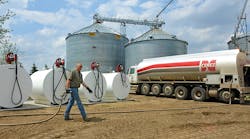With harvest right around the corner, it’s time to ask yourself: What’s in your fuel tank? The answer may surprise you.
In addition to diesel, your fuel tank can house water, rust, dirt, and algae without regular maintenance. Debris and other contaminants accelerate fuel degradation and can lead to fuel pump failure and fuel injector plugging. Over time, this can lead to expensive repairs. Before harvest gets underway, ask yourself the following questions:
1. Have you checked for water in the fuel tank recently?
Water is a five-letter word for trouble when it comes to fuel and your equipment. There are a variety of ways moisture can seep into the tank, one of which is through condensation. As temperatures rise and fall, water droplets form both inside and outside of the tank. If you have damaged vents or hoods, water can also get into your tank during rainfall. Because of this, storage tanks should be checked for water frequently. At a minimum, they should be inspected seasonally, especially during spring and fall. . A variety of monitoring equipment is available, including an automatic gauging system and a gauge stick covered with alcohol-compatible water paste. The paste changes color when water is present. If you’re not sure what kind of equipment your tank has or if you have not checked for water, contact your fuel supplier to have a fuel sample taken from the bottom of your tank for a lab report showing water content percentage.
2. Do you know best practices for preventing water contamination?
After you determine your tank is water-free, it’s time to develop a plan for how to keep that water out. Some of the best practices we recommend are:
- Make sure the tank-fill area is located above ground for underground tanks.
- Above-ground tanks should be located away from areas where rainwater and contaminants could flow in.
- Inspect gaskets, hatches, vents, and fill caps for damage. Replace if necessary.
- Check product spill containment buckets. If water is present, do not drain it into the tank. Remove and properly dispose of it instead.
- Have the tank drained and cleaned by professionals in the spring and summer.
3. When was the last time you changed your filter?
We recommend fully cleaning out your tank at least once a year. In addition to this maintenance, filters should be replaced quarterly. Clean filters go a long way to keep rust from forming and dirt from collecting.
4. Does the quality of my fuel meet the advanced needs of my equipment?
Farmers are accustomed to fending off unwanted intruders in their fields. But what about their fuel tank? When it comes to fuel contaminants, moisture, dirt, and debris are the leading culprits, which can spell BIG trouble for today’s more complex, high-pressure diesel engines. More than ever, it’s important to use a premium diesel product that contains a complete additive package, including detergents, demulsifiers, and fuel stabilizers. Cenex Ruby Fieldmaster and Cenex Roadmaster XL, are two leading products shown to improve efficiency and restore horsepower, keeping your operation up to speed.
A well-maintained fuel tank will lead to a well-run harvest. Should any questions or concerns come up while you are running through your preparation checklist, contact your local Cenex dealer.



